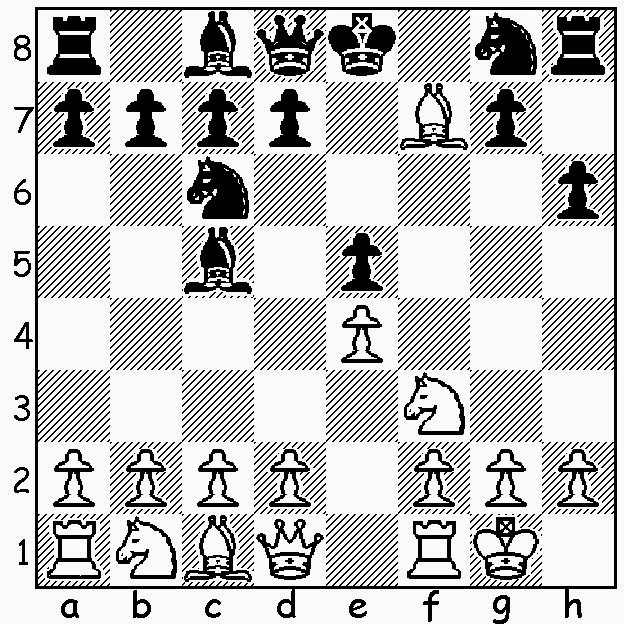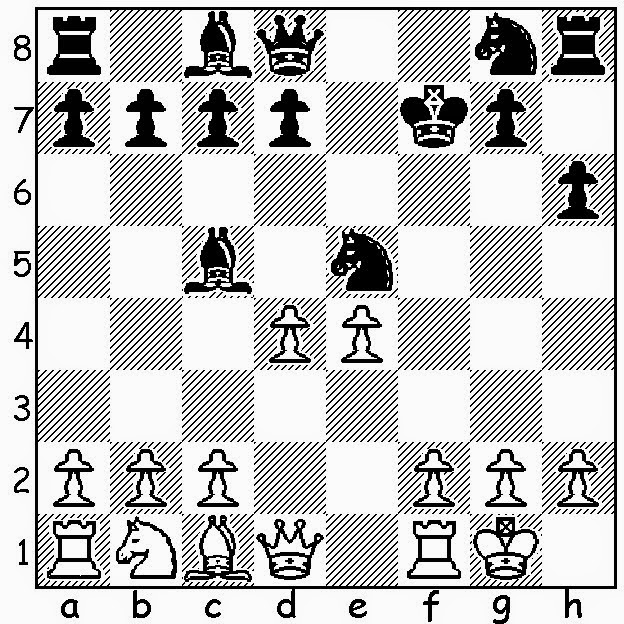1.e4 e5 2.Nf3 Nc6 3.Bc4 Bc5 4.Bxf7+ ...and related lines
(risky/nonrisky lines, tactics & psychology for fast, exciting play)
Friday, October 10, 2014
Nothing Subtle
mmorris - crownking
blitz, FICS, 2012
1.e4 e5 2.Nf3 Nc6 3.Bc4 h6
The Semi-Italian Opening.
4.O-O Bc5 5.Bxf7+
5...Kxf7 6.Nxe5+ Nxe5 7.d4
7...Bxd4 8.Qxd4 d6 9.f4 Nc6
10.Qa4
Previous games have seen 10.Qc4+, 10.Qd5+, 10.Qf2 and 10.Qd2.
10...Nge7 11.f5 Kg8 12.f6
There is nothing subtle about White's intentions.
12...gxf6 13.Rxf6 Bd7
Black is too casual about defending his King, which is suddenly checkmated.
14.Qb3+ d5 15.Qg3+ Kh7 16. Rf7 checkmate
Wednesday, October 8, 2014
Updating the Semi-Italian Jerome Gambit
I have had a long-term interest in the Semi-Italian Jerome Gambit, so-called because it can arise from the move order - among others - 1.e4 e5 2.Nf3 Nc6 3.Bc4 Bc5 4.Bxf7+ Kxf7 5.0-0 h6. (For example, see "A Jerome Look At The Semi-Italian Opening" Parts 1, 2, and 3).
More than a third (37%, actually) of the games in The Database with this move order were played by me, and I've scored 89% with the line.
I thought it was a good time to take another look at some recent games and update my knowledge.
ndrwgn - latang
standard, FICS, 2013
1. e4 e5 2. Nf3 Nc6 3. Bc4 h6
The Semi-Italian Opening.
4. O-O Bc5 5. Bxf7+
The Semi-Italian Jerome Gambit.
5...Kxf7 6.Nxe5+ Nxe5 7.d4
I was surprised to see that Houdini 3 prefers this move to my choice, 7.Qh5+. I have played 7.d4 in only 3 of my 54 Semi-Italian Jerome Gambit games. Shows what I know.
7...Bxd4
I wondered how often Black played 7...Qh4!? in this position, similar to 6...Qh4!? in the main line Jerome Gambit with 6.d4 (instead of 6.Qh5). It turns out that there is only one game example in The Database, HauntedKnight - keeper, blitz, FICS, 2012 (0-1, 26). This line deserves further exploration.
8.Qxd4 d6
There are 9 examples of ndrwgn playing this position in The Database, and he has scored 56%.
9.f4 c5
"Meeting A Threat With A Threat", but 9...Nc6 was a more stable alternative. The text causes immediate difficulties.
10.Qd5+ Be6 11.fxe5+ Ke8 12.Qxe6+ Ne7 13.exd6 Qb6 14.Qxe7 checkmate
Monday, October 6, 2014
Bop!
Playing the Jerome Gambit is a lot like giving your opponent a weapon - and then stepping in and bopping him on the nose before he figures out how to use it. If you are fast or skilled (or lucky) enough, you can walk away with a win.
IagainstI - kingphilippineda
blitz, FICS, 2013
1.e4 e5 2.Nf3 Nc6 3.Bc4 Bc5 4.Bxf7+
4...Kxf7 5.Nxe5+ Nxe5 6.Qh5+ g6 7.Qxe5 Qe7
This is Whistler's Defense, as opposed to the much better known 7...d6, Blackburne's Defense. The offered Rook is poison.
8.Qxh8
When Alonzo Wheeler Jerome played this move against D.P. Norton in a correspondence game in 1876, the American Chess Journal, June 15th, noted that it was "[P]layed experimentally; and analysis will probably show the capture to be unsound." White was fortunate to draw the game, however.
8...Qxe4+
Black immediately lost his way with 8...Qf6 9.Qxh7+ Kf8 10.O-O Black resigned, Wall,B - Sepoli, Chess.com, 2010. Bop!
9.Kf1
Even worse is 9.Kd1 although you couldn't tell by the result of Wall,B - Mathieubuntu, FICS, standard 40 0, 2011 (1/2 - 1/2, 14). Bop!
A more representative 9.Kd1 game is blackburne - perrypawnpusher, JG3 thematic, ChessWorld.net, 2008 (1-0, 17). The earliest example, equally educational, is Jerome,A - Whistler,G, correspondence, 1876 (0-1, 15).
9...Qc4+
9...Nf6 was the start of White getting off the hook in Jerome,A - Norton,D, correspondence, 1876 (1/2, 1/2, 20). Bop!
Likewise, the text gives White a breather, and that is all that he needs to reverse his fortunes.
Instead, Black needed to continue to both attack and defend with 9...Qh4.
10.d3
The only move.
10...Qxc2 11.Qxh7+
Now White's Queen is more dangerous, and Black's King is more at risk.
11...Kf8 12.Bh6+ Nxh6 13.Qxh6+ Kf7 14.Qf4+
Or 14.Qd2 Qa4 15.Nc3 d6 16.Nxa4 Black resigned, in Abijud - Jeru, blitz, FICS, 2005. Bop!
14...Ke8 15.Nd2 Qxd3+ 16.Kg1 Bd6 17.Re1+ Kd8
Black resigned
Mate will arrive in a couple of moves.
Even against the better defense 17...Be7, Black's unsafe King would guarantee more suffering, e.g. 18.Qf6 Qd6 19.Qh8+ Kf7 20.Nc4 when the entry of White's Knight will either cost Black his Queen, or lead to checkmate. Bop!
IagainstI - kingphilippineda
blitz, FICS, 2013
1.e4 e5 2.Nf3 Nc6 3.Bc4 Bc5 4.Bxf7+
4...Kxf7 5.Nxe5+ Nxe5 6.Qh5+ g6 7.Qxe5 Qe7
This is Whistler's Defense, as opposed to the much better known 7...d6, Blackburne's Defense. The offered Rook is poison.
8.Qxh8
When Alonzo Wheeler Jerome played this move against D.P. Norton in a correspondence game in 1876, the American Chess Journal, June 15th, noted that it was "[P]layed experimentally; and analysis will probably show the capture to be unsound." White was fortunate to draw the game, however.
8...Qxe4+
Black immediately lost his way with 8...Qf6 9.Qxh7+ Kf8 10.O-O Black resigned, Wall,B - Sepoli, Chess.com, 2010. Bop!
9.Kf1
Even worse is 9.Kd1 although you couldn't tell by the result of Wall,B - Mathieubuntu, FICS, standard 40 0, 2011 (1/2 - 1/2, 14). Bop!
A more representative 9.Kd1 game is blackburne - perrypawnpusher, JG3 thematic, ChessWorld.net, 2008 (1-0, 17). The earliest example, equally educational, is Jerome,A - Whistler,G, correspondence, 1876 (0-1, 15).
9...Qc4+
9...Nf6 was the start of White getting off the hook in Jerome,A - Norton,D, correspondence, 1876 (1/2, 1/2, 20). Bop!
Likewise, the text gives White a breather, and that is all that he needs to reverse his fortunes.
Instead, Black needed to continue to both attack and defend with 9...Qh4.
10.d3
The only move.
10...Qxc2 11.Qxh7+
Now White's Queen is more dangerous, and Black's King is more at risk.
11...Kf8 12.Bh6+ Nxh6 13.Qxh6+ Kf7 14.Qf4+
Or 14.Qd2 Qa4 15.Nc3 d6 16.Nxa4 Black resigned, in Abijud - Jeru, blitz, FICS, 2005. Bop!
14...Ke8 15.Nd2 Qxd3+ 16.Kg1 Bd6 17.Re1+ Kd8
Black resigned
Mate will arrive in a couple of moves.
Even against the better defense 17...Be7, Black's unsafe King would guarantee more suffering, e.g. 18.Qf6 Qd6 19.Qh8+ Kf7 20.Nc4 when the entry of White's Knight will either cost Black his Queen, or lead to checkmate. Bop!



















